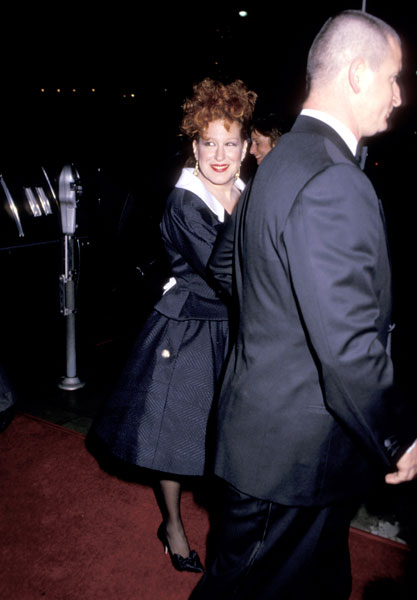Bette arrives at the Beaches premiere
Playbill
Three Songwriters, One Voice: Meet the People Behind Broadway’s The People in the Picture
By Harry Haun
April 1, 2011
“Beaches” novelist Iris Rainer Dart draws on her past to imagine The People in the Picture, a new Broadway musical, with music by Mike Stoller and Artie Butler.
Improbably perhaps, the lone female comedy writer for “The Sonny and Cher Show” and the composer who kept Elvis Presley in a memorable state of perpetual motion constitute two-thirds of the creators responsible for The People in the Picture, an original Holocaust-haunted musical that is the final Broadway show of the 2010-2011 theatre season. Now in previews, it officially opens April 28 in a Roundabout Theatre Company production at Studio 54.
Broadway, it seems, is the new (and better-late-than-never) beachhead for the writer, Iris Rainer Dart, a nine-time novelist whose best-selling “Beaches” became Bette Midler‘s top-grossing “Beaches” movie in 1988. She grew up in the Hill District of Pittsburgh where August Wilson sprinkled decades of his denizens in his ten-play cycle. Her father, a social worker at the Irene Kaufman Settlement, “was involved in the first interracial theatre group there, The Curtaineers,” and it was always a dream that she would cross paths with Wilson “and we’d talk about those days, but it never happened,” she says. Wilson died in 2005 at 60. “We were about the same age.”
By five, she had the acting bug and was performing at the Pittsburgh Playhouse Theatre, ultimately turning into an acting major at Carnegie Mellon (then, Carnegie Tech), “but I was such a bad actress that, when my parents would come backstage, they couldn’t make eye contact.” Taking the hint and her inherited humor, she drifted to the other side of the footlights and wrote varsity musicals for the Scotch ‘n’ Soda Theatre there. “I pitched the ideas, then wrote the book and lyrics over the summer. When I came back, a 16-year-old freshman called me and said, ‘I’d like to write the music for you.’ It was Stephen Schwartz, and we won some BMI awards.”
Now, flashing waaaay forward, she’s taking on Composer No. 2 for The People in the Picture – Mike Stoller, who has never had another lyricist since he met Jerry Leiber 60 years ago last fall and they started their jukebox juggernaut on a note of political incorrectness called “Real Ugly Woman.” (Hey, it was 1950!) Their hit parade of take-out-the-trash-and-go-directly-to-the-bank ditties were gloriously recounted and celebrated in the longest-running musical revue in Broadway history, the Grammy-winning and Tony-nominated Smokey Joe’s Café – “Yakety Yak,” “Hound Dog,” “Love Potion #9,” “Loving You,” “Love Me,” “Jailhouse Rock,” “Stand By Me,” “Kansas City,” “There Goes My Baby,” “King Creole,” et al. They survived The Beatles, The Rolling Stones – even the sinking of the Andrea Doria (Stoller was among the survivors of the 1956 maritime disaster).
It was the gift of melody, pure and simple, that drew Dart to Stoller, who hardly had his “This Tunesmith for Hire” sign out. “Who doesn’t know Mike and Mike’s work?” she asks rhetorically. “I wanted somebody who wrote a great tune that was singable.” Her melodic standards were set early, at age 14, when she saw Ethel Merman knock Gypsy out of the Imperial. “And during my acting days I did summer stock where we did 12 musicals in 12 weeks. Shows that are the best are the ones that have tunes you walk out singing. That’s so rare now. When somebody suggested I speak to Mike, I said, ‘Oh, my God! Mike Stoller! Even I, with my bad singing, can sing every song he wrote.’ So melody is back, in this show, for sure!”
Leiber and Stoller (who were born 40 days apart in 1933) took this professional split in stride. “At the time,” remembers Stoller, “I did mention to Jerry that I had been asked to write a musical with somebody else (Dart, who penned the lyrics and libretto). He said, ‘Well, we’re not doing anything at the moment. Why don’t you go ahead?’ We just didn’t know how long a moment that would be.”
For Stoller, it has been 11 years – four less than the story has been ruminating in Dart’s head. “Both my parents were immigrants,” she says. “My mother came over from Russia, my father from Lithuania. We had no money, but it was an idyllic childhood. I look back on it, and it’s hard to figure out why. Eventually, I realized it was the sensibility of the Yiddish culture where there was so much laughter. There wasn’t anything we couldn’t turn into a joke. I spent my childhood laughing. That catapulted me into comedy writing. I’d learned to look at the world in a funny way.”
Humor as a survival tool got a profound application during the Nazi march over Poland – as Ernst Lubitsch demonstrated in his classic Jack Benny-Carole Lombard comedy, “To Be Or Not To Be,” and as Dart echoes here – only her story is split-level, torn unevenly between Poland in the 1930s and New York City in the 1970s.
Two-time Tony winner Donna Murphy spans this gap, playing one character, a 39-year-old actress who stars in and creates Yiddish musical-comedy films in the face of anti-Semitism and the Nazi threat, who eventually ages into an immigrant “bubbie” trying to share her culture and past with her granddaughter (Rachel Resheff) – but getting turbulent interference from her own daughter (Nicole Parker).
A Grade-A supporting cast includes Stuart Zagnit, Alexander Gemignani, Chip Zien, Christopher Innvar, Lewis J. Stadlen, Hal Robinson and Joyce Van Patten.
The musical was created long-distance – with a deep bow to modern technology, by way of email – with Stoller in Los Angeles and Dart in the Monterey Peninsula.
Very early on – about two songs along, in fact – says Stoller, “Iris sent me an email saying, ‘Y’know, we’re going to need demos and we should get an arranger to do them.’ She had asked around and said, ‘Have you ever heard of someone named Artie Butler? If so, do you like him?’ And I emailed back, ‘I do know Artie Butler. I don’t like him. I love him!’ I said, ‘He’s not only a wonderful arranger and keyboard player, he’s also a fine composer in his own right. Why don’t we invite him in?'”
Backstory: Butler was a recording-studio button-pusher in the heyday of Leiber-Stoller hits. At one particular session, the pianist couldn’t play the music so Butler, being 18 and eager, jumped in and said, “Let me do it.” Butler remembers this as ten years ago, but it’s more like eons. “He played the piano, and he sold us,” says Stoller.
Moving above and beyond that Leiber-Stoller starting point, Butler has been involved in every imaginable phase of the music biz, arranging, composing, producing, playing or supervising on hits like Joe Cocker’s “Feelin’ Alright,” Barry Manilow’s “Can’t Smile Wthout You,” Dionne Warwick‘s “I Know I’ll Never Love This Way Again,” Neil Sedaka’s “Laughter in the Rain,” Vicki Lawrence’s “The Night the Lights Went Out in Georgia.” All that, and he also wrote “Here’s to Life.”
Once Butler stepped up to augment Stoller’s score, there was some fleeting concern that their joint efforts would not match. “Two composers sounded very odd to me,” admits Dart. “I didn’t know if it made any sense because people who knew their work would automatically know who wrote what. But Mike said at that time, ‘Don’t worry, it will be seamless.’ And I still thought, ‘How could it possibly be seamless?’
“But right after we finished the first draft, we got together and had a reading. Artie’s Significant Other and Mrs. Stoller were both there, and neither one of them knew who wrote what. And we’ve had directors who have guessed wrong as well.”
A self-satisfied Stoller seconds the motion, dryly: “It was seamless, so it seems.”
As a lyricist with two composers at her disposal, Dart had the best of both worlds: “Mike likes to work with lyrics first, and Artie likes to write music first. Artie’ll say to me, ‘Just tell me what happens in the scene, who’s singing it and maybe the title.’ Then, he goes off and comes back with a fabulous tune. Once, he came up with this gorgeous melody, and I was thinking ‘What could it be?’ Then I remembered my grandmother – my ‘bubbie’ – used to say to us, ‘Remember who you are.’ And it just happened to fit exactly with the first line. I said, ‘That’s what the song is going to be.’
“I had a whole script written”¦so I pretty much could go through and say, ‘This feels like a place where the emotion is so elevated that a song should happen here,’ so then I would write those lyrics and give them to Mike, or I’d call Artie and say, ‘Here’s what happens here.’ When I’d pick up the phone and hear Artie saying, ‘I was up at four o’clock this morning,’ I’d think, ‘This is the best news.’ It meant he was about to play, over the phone, something to me I was going to love. And I did.”
Their songs, as show tunes do and should, advance and enhance the story, they say. “The desire has always been to tell the story,” stresses Dart, quoting her director, Leonard Foglia. “He’s been on board for seven years. I call him ‘my common-law director’ we’ve been together so long. I will send him an idea – ‘This should happen in this scene, or how about a song here?’ – and he’ll always say, ‘What’s the story we’re telling? Let’s go back to the characters.’ He was able to bring that kind of focus to it.
“We don’t see the concentration camps. I made a vow to myself: No Nazis on the stage. I think anybody who knows their history really knows what’s going on outside, so it’s really about this actress and these people and how they interrelate and what’s happening with them in their personal lives. Most of it takes place in her mind. I used to think, ‘This can’t be an expensive show to mount because it all takes place in someone’s mind.’ She’ll be in the ’70s, and then suddenly she’ll look back into the ’30s. Donna somehow – I mean, talk about seamless! – I don’t know how she does it – but we watch her, and with no effort she changes into a different person.”
Of late, the focus has gained another dimension through the choreography of Andy Blankenbuehler, a Tony winner for In the Heights. “When we came in about a month ago,” says Butler, “we saw him do two songs – one of Mike’s songs and just 16 bars of one of mine, and it just blew us away to see how the songs now work.”
So what is their “Some Enchanting Evening,” their take-away song? Butler ducks the question engagingly. “We don’t have an 11 o’clock number,” he brashly announces. “We have a 10:45 song, and we live on the coast so it’s three hours earlier.”









I saw this show on Friday night and it was great but oh my goodness, it is a tearjerker! I should have known to bring some kleenex!
Cool Shaunna….but i can just imagine how this would pull your heartstrings….